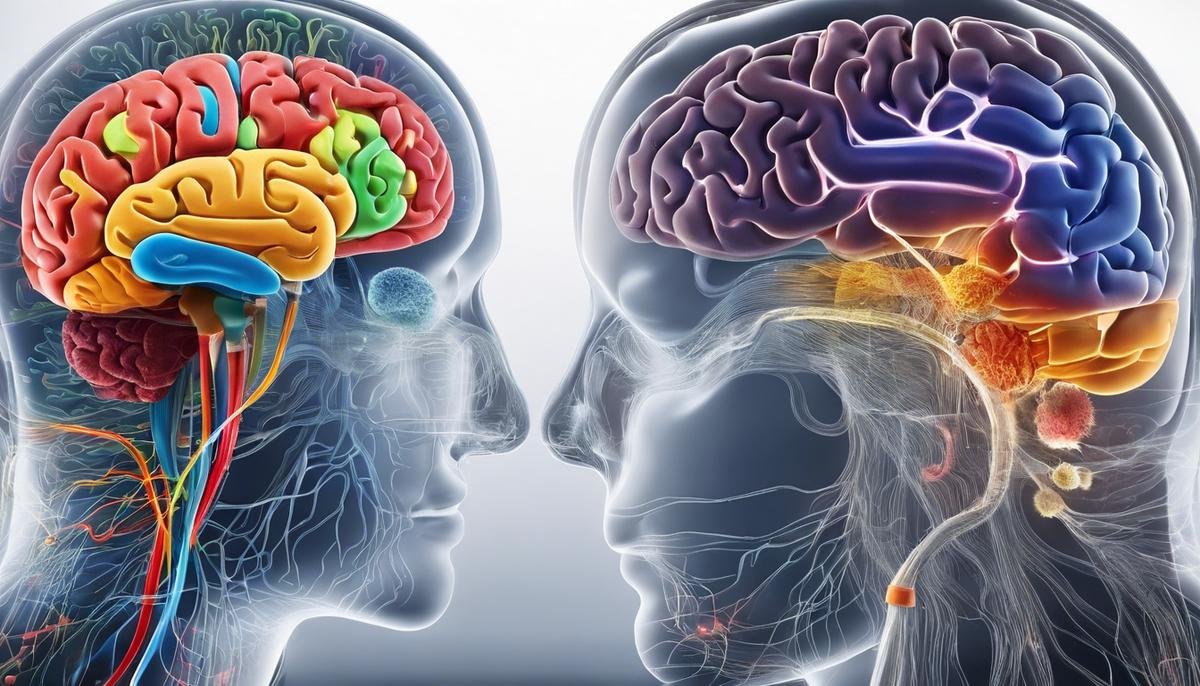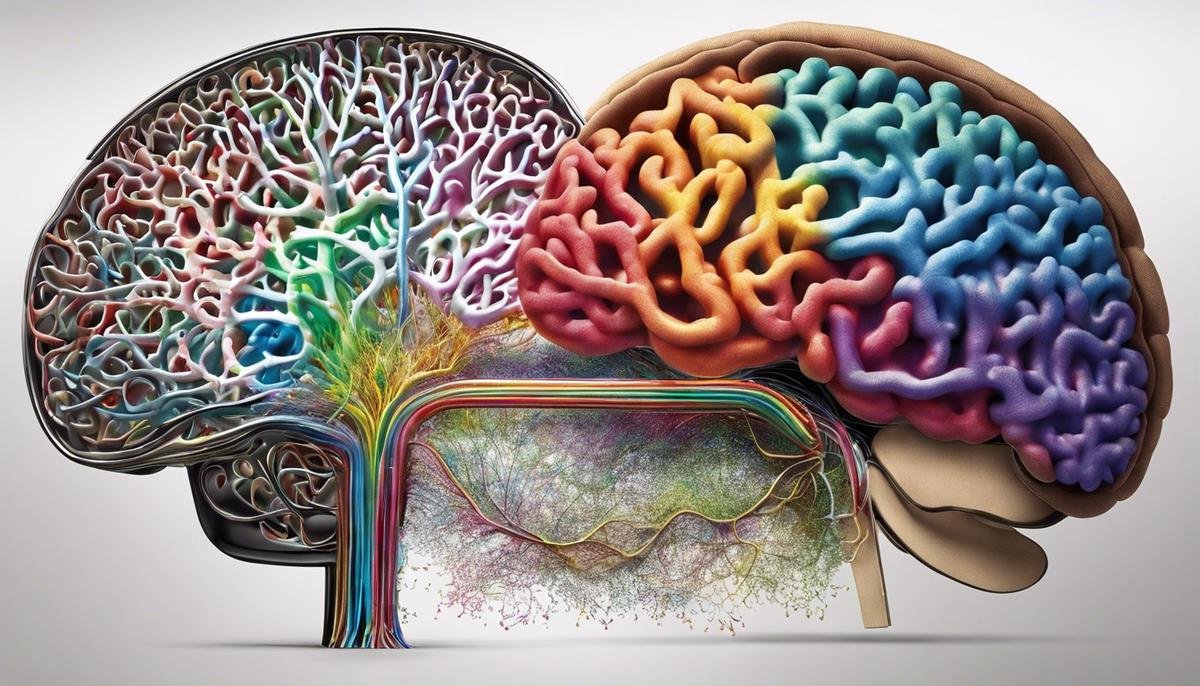
The intricate connections between our digestive systems and our brains are revealing surprising insights, particularly within the realm of autism spectrum disorder (ASD). Far from being a solitary organ, the gut is now recognized as a key player in neurological health, wielding the potential to shape behavior, mood, and cognitive function. This exploration delves into the mysterious gut-brain axis and its influential role in ASD, dissecting the complex web that links intestinal flora to our neural pathways. As we unravel the significance of gut health on neurological and behavioral manifestations associated with autism, we stand at the precipice of a new frontier in understanding and potentially managing this multifaceted condition. Through this inquiry, we aim to illuminate the promising intersection of gastrointestinal well-being and autism, embarking on a scientific journey that holds the promise of reshaping lives.
The Gut-Brain Connection in Autism
The Gut-Brain Connection: Understanding Autism and the Role of Digestive Health
Hey there, amazing parents and caregivers!
It’s no secret that raising a child on the autism spectrum comes with its unique set of challenges and joys. And, just when you feel like you’ve got a handle on things, research comes along that shifts the way we think about autism and how to support our kiddos. One such game-changer is the growing body of evidence linking gut health to autism symptoms. Let’s dive into what this means for our families.
You may have heard the buzz about the gut-brain axis, but here’s the scoop: our guts and brains constantly chat through a hotline known as the vagus nerve. This gut-brain connection means that the state of our digestive system can have a major influence on mood, mental health, and you guessed it, autism symptoms.
For kids on the spectrum, the gut is often a focus because many experience gastrointestinal (GI) issues, like tummy troubles, food sensitivities, and irregular bowel habits. When these GI issues are ongoing, they’re not just uncomfortable – they can actually shape behavior and cognitive functions. Scientists are now trying to piece together the puzzle of how exactly gut health and autism are related.
Research has found that many autistic individuals have a different composition of gut bacteria compared to neurotypical peers. This unique gut microbiome can influence the severity of autism symptoms. Some studies hint that certain types of gut bacteria are linked to more significant communication and behavior challenges. It makes one think, doesn’t it?
The idea here is that these little microorganisms might affect brain development and function by producing compounds that send signals to the brain, influencing how it operates. Some of these signals might crank up symptoms like anxiety, or make it harder to handle sensory input.
While this might sound a bit science-fiction, it’s actually a fascinating window into potential new ways to support our children’s well-being. For instance, dietary changes that promote a healthy gut – think probiotics, prebiotics, and fiber-rich foods – could become a part of our toolkits for managing autism symptoms.
Getting a handle on gut health can start with simple steps:
- Incorporating a diverse range of nutritious foods,
- Considering a personalized diet plan that might rule out irritants like gluten or casein,
- And chatting with healthcare professionals about probiotics and other supplements.
Remember, each child’s needs and responses can be different – there’s no one-size-fits-all approach. With attention and care to what fuels our children’s bodies, we might notice positive changes in their behavior and overall health, potentially easing some autism-related challenges.
Above all, it’s vital to make decisions based on compassionate care and solid research. Partner with doctors and nutrition experts to craft a plan that suits your child’s unique needs. The journey to understanding autism is ongoing, but together, with tender love and a dash of curiosity, we can uncover new paths to helping our kids shine their brightest.
Here’s to nurturing our children, inside and out. Keep loving, keep learning, and let’s keep creating those happy, healthy home environments that our families thrive in. Cheers to flourishing families and the powerful guts that keep us going!

Probiotics and Autism: Potential Benefits
Welcoming Probiotics to the Family: How They May Offer a New Twist on Autism Support
When it comes to nurturing a family member on the autism spectrum, many of us are no strangers to the array of approaches that aim to support their well-being. We’ve adjusted diets, scheduled therapies, and embraced routines — all with open arms and hearts. But have you ever pondered what a spoonful of beneficial bacteria could do? Yes, we’re talking about probiotics!
You may already know that probiotics are the good guys in the microbial universe, famed for their role in promoting gut health. But for our loved ones on the autism spectrum, they might just be the unsung heros, bringing about more than just a happy tummy. After all, gut health is at the epicenter of overall wellness!
Let’s delve into the nitty-gritty. Probiotics have made quite the splash as a supportive strategy for various health concerns, autism included. By balancing gut bacteria, they aim to ensure our digestive system is a well-oiled machine. For our kiddos on the spectrum who frequently face gastrointestinal challenges, this balance might be a game-changer.
Now, how about behavior – could these microscopic allies really influence it? It seems they might. The gut-brain axis is a two-way street – what happens in the gut doesn’t just stay in the gut. It’s like a chit-chat between the brain and digestive system, potentially impacting mood, stress response, and yes, behavior.
Now, roll up your sleeves because it’s about practicality time. Probiotics come in many forms: yogurts brimming with live cultures, fermented foods like kimchi and sauerkraut, and supplements when diet alone isn’t hitting the mark. It’s a smorgasbord of choices!
On this journey, keep a keen eye on the individual needs of your loved one on the spectrum. What works for one might not suit another. Each gut is as unique as a fingerprint, and thus, requires its own action plan.
And remember, nurturing those tummy tenants with prebiotics – fibers that feed good bacteria – is as crucial as the probiotics themselves. Think of them like the soil that nourishes the garden of gut flora.
Sure, the science of probiotics in autism is still budding, but it’s a field ripe with potential. As a family united by similar experiences, sharing discoveries, triumphs, and challenges is how we grow stronger. So, let’s keep exploring and supporting one another as we add probiotics to our toolkit of autism care.
Don’t forget, no single approach is the holy grail. In the end, it’s about creating a symphony of strategies that cater to individual needs. That’s the beauty of our shared path – finding harmony in the health of our loved ones, one gut-friendly step at a time. Let the power of probiotics be part of that melody.

Dietary Interventions in ASD
Exploring the Role of Omega-3 Fatty Acids in Autism Spectrum Disorders
When it comes to nurturing the best in our children, their physical well-being is the foundation of their overall health. For families navigating life with autism spectrum disorders (ASD), dietary choices can be a key player in managing not just physical health, but also cognitive and behavioral challenges.
Diving into the realm of omega-3 fatty acids reveals a compelling avenue for empowering gut health and, in turn, supporting neurological well-being. These essential fats, known for their anti-inflammatory properties, are not synthesized by the human body and must be obtained through diet. Their importance in cognitive function and brain structure makes them a focal point for improving life for children on the spectrum.
Omega-3s, found in foods like fatty fish (think salmon, mackerel, and sardines), flaxseeds, chia seeds, and walnuts, have been linked to improved nerve function and synaptic plasticity. Regular inclusion of these foods in a child’s diet may offer a cascade of positive effects that can soften the severity of some symptoms associated with ASD.
The relationship between omega-3 fatty acids and gut health takes center stage when considering their role in modulating the immune system. By potentially reducing GI inflammation, which is often a cause for discomfort in children with ASD, these fats can help maintain a hospitable environment for beneficial gut flora. This creates a more balanced microbiota, which is crucial for gut-brain communication.
Shifting the diet to accommodate more omega-3 rich foods may seem daunting, but there are simple and delicious ways to do it. Introducing a ‘Fishy Fridays’ dinner tradition or integrating smoothies with flaxseed oil into breakfast routines can make this transition smoother for the whole family. For families concerned with potential contaminants in seafood, high-quality omega-3 supplements can serve as a practical alternative.
Sensitivity to new foods and tastes can sometimes pose a challenge with children on the autism spectrum. Creativity in preparation and patience in introduction can make all the difference. Gradually increasing the presence of omega-3 foods, while paying close attention to the child’s responses, can lead to successful dietary integration.
Finally, while studies are still on-going to comprehend the full scope of benefits offered by omega-3 fatty acids in the context of ASD, anecdotal evidence suggests that these dietary tweaks could bring significant improvements to some children’s quality of life. As with any dietary change, consultation with a healthcare provider familiar with the child’s individual needs ensures tailored guidance and safe implementation.
Community sharing stands as a pillar when navigating the journey of parenting children with ASD. The collective wisdom of parents, caregivers, and healthcare professionals continues to shape a nurturing network that thrives on shared experiences and support.
With a mindful approach to dietary habits and a compassionate community at one’s side, one can hope to see brighter days for children on the autistic spectrum, where each meal brings a spoonful of comfort and a helping of hope.

Recognizing and Addressing Gut Issues in Children with Autism
Recognizing the Signs of Gut Problems in Children with Autism: A Guide for Concerned Families
As attentive caregivers, we know that each child on the autism spectrum is unique, and that includes their physical health. Some children might have digestive discomfort that goes unnoticed because of difficulties in communication. That’s why understanding the signs of gut problems in children with autism is essential to addressing any underlying issues and enhancing their quality of life.
One telltale sign of gut distress is a change in a child’s behavior. If a typically upbeat child becomes irritable or shows an increase in behavioral outbursts, it could be their way of expressing discomfort. Sleep disturbances, another common indicator, might suggest pain or discomfort that makes it difficult for a child to get the rest they need. A parent might also notice their child exhibiting increased stimming behaviors, which could be a response to internal unease.
Physical symptoms are equally telling. Chronic diarrhea, constipation, or unusually foul-smelling stools may signal an imbalance in gut flora or other gastrointestinal problems. Likewise, bloating, gas, or a swollen belly can point to digestive difficulties. Sometimes, less obvious signs such as skin rashes or eczema can also be linked to gut health.
How can families set the stage for a healthier gut? It starts with keeping a symptom diary. Documenting behaviors, bowel habits, and meals can help uncover patterns and trigger foods. Having this information on hand is invaluable when consulting healthcare providers for a precise diagnosis and to craft an effective treatment plan.
Another practical measure is ensuring that children are adequately hydrated. Water plays a crucial role in digestive health. Encouraging your child to drink ample fluids can help alleviate some symptoms of GI distress.
Enzymes can be key players in digestive health. Digestive enzyme supplements could assist in breaking down foods, making it easier for nutrients to be absorbed and lessening the burden on the gut. It’s important, however, to first check with a healthcare professional to determine if these supplements are a good fit for your child’s unique needs.
Remember, each stride forward in understanding how gut health intersects with autism is a step towards providing children with the holistic support they deserve. Grassroots movements, peer-led groups, and online communities offer rich resources where families can connect, share insights, and uplift one another.
Navigating the intricacies of autism is a collective journey that thrives on warmth, wisdom, and the willingness to embrace new insights into achieving overall well-being. Together, through a blend of compassion and science, progress can be made in safeguarding the health and happiness of our extraordinary children. Because after all, as the heart of a family committed to nurturing and cherishing every member, we know that each smile, each small victory, is a milestone worth celebrating on this shared path of love and discovery.

As we traverse the evolving landscape of autism spectrum disorder and its intimate connection with gut health, we remain guardians of our own understanding, empowered by knowledge and the pursuit of well-being. The interplay of diet, probiotics, and dedicated care strategies form a tapestry of potential avenues for improving the quality of life for individuals with autism. With each new discovery and therapeutic experiment, hope flickers on the horizon, guiding families and healthcare professionals toward a deeper comprehension and more effective interventions. Rooted in science, nurtured by compassion, our collective endeavor to address and ameliorate the gastrointestinal and behavioral challenges faced by those on the spectrum continues unabated, fueling a future where the harmony of body and mind is not just an ideal, but a tangible reality for all.




